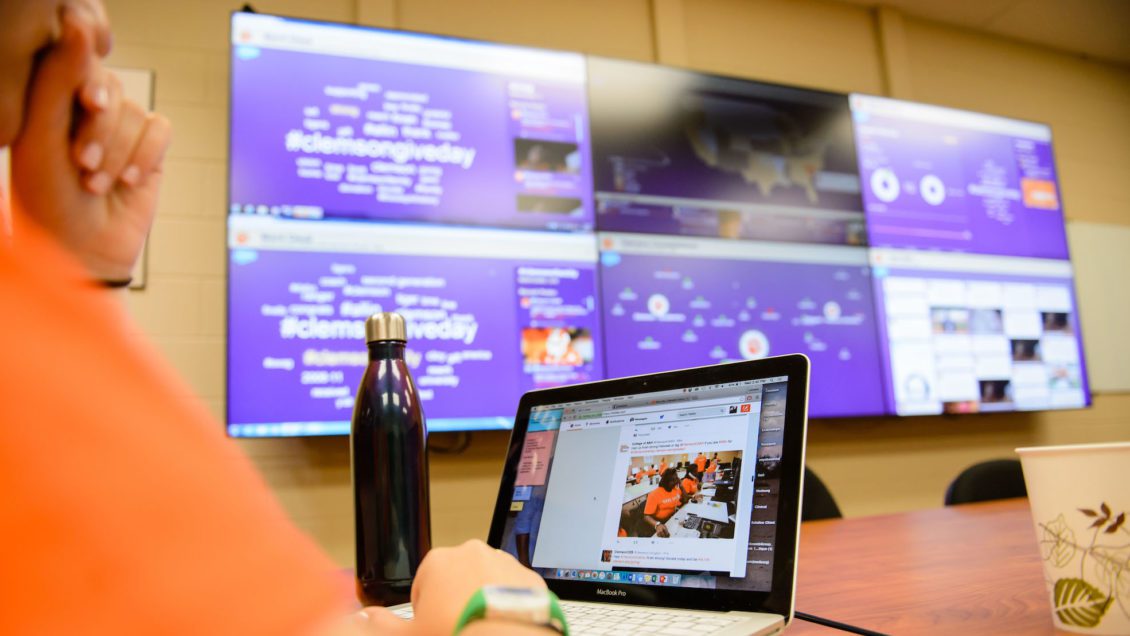 Update: Results from the Palmetto Poll available
Update: Results from the Palmetto Poll available
The Clemson University Palmetto Poll predicts Joe Biden will win the South Carolina Democratic primary with 35 percent* of the vote and Tom Steyer will come in second with 17 percent* of the vote. Clemson faculty announced the results at a press conference held earlier today in the Social Media Listening Center at Clemson University.
The full results can be viewed by clicking here.
Palmetto Poll at Clemson to utilize social media analytics in advance of 2020 Democratic primary, general election

Clemson University will revive and modernize its Palmetto Poll by combining social media analytics with traditional polling methods in the statewide public opinion survey. Clemson faculty involved in the Palmetto Poll are already gathering data from political conversation using the university’s Social Media Listening Center in order to inform polling activities around the 2020 Democratic primary and the 2020 presidential election.
The poll has contributed to the public dialogue among South Carolinians since 1999 by sharing information about the attitudes, behaviors and characteristics of the state’s voters obtained through traditional polling methods. Bruce Ransom, professor in Clemson’s political science department, has served as co-director of the poll since its inception. Ransom said the center is one of the few of its kind in the country, and with the political conversation increasingly moving online, it will prove to be a valuable tool in providing information on voter attitudes.
“We’re excited to partner with faculty and students in the Social Media Listening Center to continually monitor political conversation,” Ransom said. “It is now common sense to start with online conversation to acquire data that will accompany and inform any traditional polling we perform in the coming months.”
The entirety of the Palmetto Poll’s participating faculty and resources come from Clemson’s College of Behavioral, Social and Health Sciences. Ransom and other faculty members began analyzing data on various social media platforms in May 2019. Steven Miller, associate professor in Clemson’s political science department, saw the benefit of leveraging the capabilities of the center to identify and begin monitoring keywords and attitudes toward candidates as the Democratic primary contenders emerged.
The center’s technology allows searches to be as broad or narrow as users require them to be, so by fine-tuning search criteria, faculty can drill down on South Carolina residents’ social activity and attitudes toward political topics.
By continually monitoring keywords and mentions of primary candidates’ names, the center’s technology allows faculty to monitor general “buzz” around candidates as well as how successfully media coverage has fanned discussion of political topics on social media. Miller said the real power of the center will come as conversation and the topic of the day changes leading up to elections.
“The center is a powerful tool simply because we can augment searches and add new searches on the fly as the conversation changes,” Miller said. “We are also looking forward to engaging with social users and asking them questions directly through each social platform.”
Miller said faculty have addressed the potential unrepresentative samples that social media can provide by developing a sampling framework and statistical technique to generate state-level estimates of public opinion. Miller said this technique will meet or exceed response rates to random digit dialing techniques, which have long been considered the gold standard of public opinion polling.
This is not the first time the listening center has been tapped to monitor conversation around elections. According to Joseph Mazer, chair of Clemson’s communication department that houses the listening center, faculty and regional news networks have worked with the center to monitor political conversation in real time, most notably overnight during the 2016 presidential election.
However, he sees this new approach to the Palmetto Poll as a truly unique way to employ the listening center as a political research hub. Both the communication and political science departments are housed within Clemson’s College of Behavioral, Social and Health Sciences, and Mazer said he hopes this is the start of an ongoing college initiative that will foster quality research, public engagement and student learning.
“It is always exciting to see the center used in new and creative ways, and as users get more acclimated to the powerful technology that powers the center, searches and results will only get better and more accurate,” Mazer said. “The center will go far in making the Palmetto Poll as reliable and relevant as any other poll in the state and across the nation.”
Ransom, political science professor emeritus David Woodard, social media professor Will Henderson and several student researchers will staff the Social Media Listening Center in the lead up to South Carolina’s Feb. 29 Democratic primary election. Faculty and students will offer media availability on the following dates:
Feb. 25, 2–11 p.m. – social media coverage of the Democratic presidential primary debate
Feb. 26 at 11 a.m. – press conference announcing the results of the Palmetto Poll, led by Ransom and Woodard, with a prediction on the winner of the Feb. 29 Democratic presidential primary election
Feb. 29, 2-11 p.m. – social media coverage of the Democratic presidential primary election
The Social Media Listening Center is located in Daniel Hall Room 304 on the Clemson University campus.
*The survey has a margin of error of +/- 3.8 percent.
END
Get in touch and we will connect you with the author or another expert.
Or email us at news@clemson.edu

